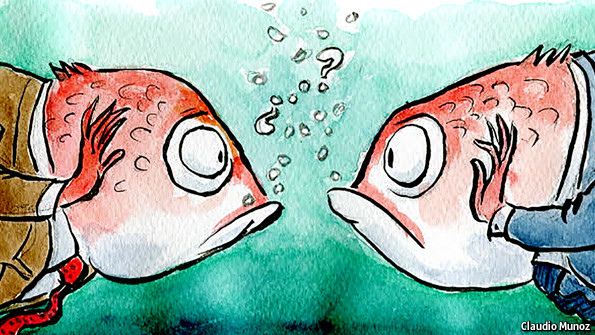
‘Justice for Aaron’ rally held in Okeechobee
August 16, 2014
Today’s war-torn Mideast is not yesterday’s Europe
August 16, 2014
SPANIARDS call a chat between two people unwilling to listen to each other a conversation between besugos—the grimacing, pop-eyed sea bream. The description often suits their politicians’ discussions, but perhaps not for much longer. With Spain’s traditional parties in decline and Catalan separatism on the rise, they may soon be forced into a proper dialogue.
The prime minister, Mariano Rajoy, missed one chance to start such a discussion when he met Catalonia’s regional president, Artur Mas, on July 30th. Catalonia’s regional parliament, where Mr Mas’s Convergence and Union (CiU) coalition is propped up by the separatist Catalan Republican Left (ERC), plans to pass a law in early September setting a non-binding referendum on independence for November 9th. Mr Rajoy, who wants to ban the referendum, will ask judges to declare it unconstitutional. That would force Mr Mas to square a circle: he has pledged both to stay within the law and to consult Catalans on independence.
A surge from the sea
One way out might be to bring forward regional elections, though the ERC would probably win as more extreme parties snatch votes off moderates like the Socialists. The latter propose a “third way” solution of greater federalism that is gaining traction with voters across Spain. If, however, Scotland votes for independence from the United Kingdom in its referendum on September 18th, that would provide a precedent in the European Union and boost Catalans’ separatist passions.
In the rest of Spain, where regional elections are scheduled for next May and general elections about six months later, the political establishment is splintering. Polls put Mr Rajoy’s centre-right People’s Party (PP) at a 25-year low. The opposition Socialists are doing even worse. With GDP at the level of 2006 and a 24% unemployment rate, voters are tiring of the two parties who have run Spain for three decades.
The Socialists have a new leader in 42-year-old Pedro Sánchez, a relative unknown who took over from Alfredo Pérez Rubalcaba in July. The latter resigned after winning just 23% of the vote in European elections in May. Mr Sánchez heads a new generation of party leaders, but must still play by old rules. He is still only party secretary-general; he must win a separate primary to become the Socialist candidate in the general election, and could find himself in a messy fight.
The bigger game-changer is a new far-left group, Podemos, which won 8% of the vote in May just months after being formed. Raw polling data now show it in a three-way tie with the Socialists and PP. Like Greece’s Syriza and Italy’s Five Star movement, Podemos is part of a new wave of radical parties to emerge from the wreckage of Europe’s economic crisis. It calls for nationalising important industries, hiking business taxes, raising the minimum wage, imposing a maximum salary, limiting the working week to 35 hours and reducing the retirement age to 60. It also suggests non-payment of “illegitimate” parts of public debt, and a referendum on leaving NATO. If it can hold together until the regional elections, Podemos will hold the key to PP bastions like Madrid and Valencia.
Podemos has a smart, telegenic leader, Pablo Iglesias, a university lecturer. But its popularity is best explained by the bad behaviour of traditional parties. Last month Jordi Pujol, a Catalan nationalist from Mr Mas’s CiU coalition who served six terms as the region’s president, admitted concealing millions of dollars from tax authorities. He joins a list of prominent tax cheats that already contains senior bankers, politicians and, allegedly, members of the royal family. Jaume Matas, a former PP president of the Balearic Islands government, is in jail. So is the PP’s former treasurer. In the Socialist stronghold of Andalusia, a series of scandals has dragged senior party members and trade unionists before a judge.
“Drip by drip, the corruption cases help Podemos,” says José Pablo Ferrándiz of Metroscopia, a polling group. Mr Iglesias refers sneeringly to mainstream politicians as la casta (the caste). The collapse last month of Gowex, an internet firm that engaged in massive accounting fraud, has increased the gloom. Spaniards now rate corruption a higher concern than the economy. Only unemployment worries them more.
Mr Rajoy hopes Spain’s nascent recovery will help him with voters. The economy grew by 0.6% in the second quarter, and showed annual net job creation for the first time since 2008. A speedy take-off could aid the PP, though stalled export growth is a danger. Only one thing seems assured: Spanish politics is fracturing. As a result parties will get smaller, and will probably have to form coalitions to govern. Sooner or later the besugos will have to start talking to each other.




